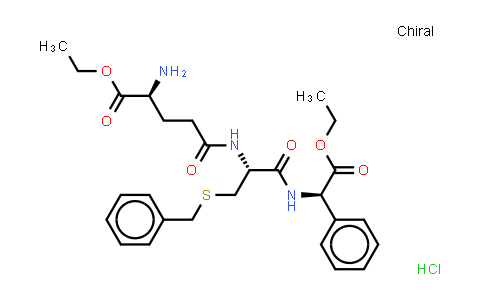
Ezatiostat (hydrochloride) NLT 98%
SKU : MC546408
CAS Number : 286942-97-0
Molecular Formula : C27H36ClN3O6S | Molecular Weight : 566.11
Synonyms : TER199;TLK199 (hydrochloride)
Quote Request| Purity | NLT 98% |
|---|---|
| Storage | at 20ºC 2 years |
* The above information is for reference only.
* If the product has intellectual property rights, a license granted is must or contact us.
| Chemical Name | Ezatiostat (hydrochloride) |
|---|---|
| CAS Number | 286942-97-0 |
| MDL Number | MFCD03701300 |
| Molecular Formula | C27H36ClN3O6S |
| Molecular Weight | 566.11 |
| Synonyms | TER199;TLK199 (hydrochloride) |
Ezatiostat hydrochloride (TER199; TLK199 hydrochloride) is a tripeptide analog of glutathione and is a selective and orally active glutathione S-transferase P1-1 (GSTP1) inhibitor. Ezatiostat hydrochloride leads to JNK activation by inhibiting GSTP1. Ezatiostat hydrochloride stimulates both lymphocyte production and bone marrow progenitor proliferation. Ezatiostat hydrochloride has the potential for myelodysplastic syndrome (MDS) treatment[1][2]. IC50 & Target: Glutathione S-transferase P1-1 (GSTP1)[1] In Vitro: Ezatiostat causes dissociation of the enzyme from the jun-N-terminal kinase/c-Jun (JNK/JUN) complex, leading to JNK activation by phosphorylation. The therapeutic action of ezatiostat appears to include both proliferation of normal myeloid progenitors as well as apoptosis of the malignant clone[1].
Selection of a resistant clone of an HL60 tumor cell line through chronic exposure to Ezatiostat (TLK199) results in cells with elevated activities of c-Jun NH2 terminal kinase (JNK1) and ERK1/ERK2, and allowes the cells to proliferate under stress conditions that induced high levels of apoptosis in the wild type cells[2]. In Vivo: Administration of Ezatiostat (TLK199), stimulates both lymphocyte production and bone marrow progenitor (colony-forming unit-granulocyte macrophage) proliferation, but only in glutathione S-transferase P1-1 (GSTP1+/+) and not in GSTP1-/- animals[2].
Related Products
© Copyright 2015-2024 Hangzhou MolCore BioPharmatech Co.,Ltd. All rights reserved.
